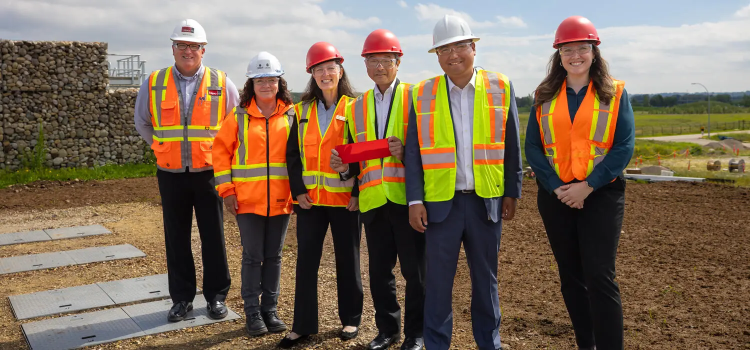When Ken Matsuda took his first water treatment job in Asia, he was focused on securing access to clean drinking water for those who need it. Growing up in British Columbia, he saw first-hand the challenges of sourcing clean drinking water in rural and Indigenous communities and wanted to be part of a solution.

From left: Mark Crowdis, Christine O'Grady, Stephanie Borgland, Ken Sasuki, Ken Matsuda, and Alison Deas. Photo Credit: Riley Brandt, University of Calgary
What he learned was that he first had to think about the communities upstream, whose sewage was flowing into the rivers that would eventually reach another community. Treating that polluted water was a massive burden on downstream communities.
While helping to install small-scale wastewater treatment units in the Philippines, Matsuda had the spark of an idea. The Japanese-made units he was installing, the FujiClean Jokaso, were solving similar problems to what he saw back home. Could they work in Canada too?
Thanks to a partnership between UCalgary, Japan Sewage Works Agency, FujiClean and Matsuda's company LM Wastewater, and funding from Alberta Innovates, we're going to find out.
Pilot will evaluate small-scale wastewater treatment technology in extreme cold
In August 2025, the FujiClean Jokaso pilot launched at Advancing Canadian Water Assets (ACWA), UCalgary's research facility embedded in the City of Calgary's Pine Creek Wastewater Treatment Facility. The project team is evaluating the Jokaso for use in cold climates, to assess if the technology can be used in rural communities, instead of septic tanks or lagoon systems.
"What makes this unit ideal for rural communities is the compactness of it," says Matsuda. "It's like having a municipal wastewater treatment facility packed into one 40-foot shipping container it's groundbreaking."
The Jokaso operates with the same biological processes used in municipal wastewater treatment. Wastewater moves through five chambers, where solids are broken down and disposed of, and the water is treated via filtration, clarification, and disinfection. The resulting effluent is clean enough to safely re-enter water sources.
"If the pilot is successful, the Jokaso unit could improve quality of life for small and remote communities by providing access to simple technology that works better than existing systems," says Christine O'Grady, executive director of ACWA. "It has the potential to advance best practices for source water protection and water treatment in Alberta and across Canada."
Why ACWA?
When Matsuda initially approached FujiClean and the Japan Sewage Works Agency, Japan's national wastewater treatment agency, about the potential in the Canadian market, their main concern was winter.
"Living here for almost all my life, I know how cold Canadian winters can get, and I know how difficult wastewater treatment is in these extreme climates. That was their first issue too How cold will it be, and will our systems work?'" says Matsuda.
He began searching for a Canadian test bed for the unit, and ACWA was the only facility with the infrastructure required. At ACWA, small amounts of municipal wastewater will be diverted to the Jokaso unit for treatment, and then sampled and tested in ACWA's labs, before being sent back to the wastewater facility for treatment.
"If the Jokaso has any issues because of the cold, our wastewater will discharge into the municipal facility for treatment. It won't go into the river," Matsuda explains. "If we were to go to a remote community or municipality to pilot this, we would bear that risk of it not working, and the community would have to bear that risk as well."
Partnerships make it possible
The pilot is the first project under a Memorandum of Understanding between UCalgary and Japan Sewage Works Agency.
"Working with the university gives us a chance to learn from one of the top teams in water and the wastewater sector," says Ryo Matsuda, project manager, International Affairs Department, Japan Sewage Works Agency. "Through this collaboration, we can test and improve our technologies in a very different climate and environment, and exchange knowledge to strengthen Japan Sewage Works Agency's capabilities."
At ACWA, the pilot project is an opportunity to demonstrate the capacity of the research facility's infrastructure. "ACWA is fully embedded in the Pine Creek Wastewater Treatment Facility, and we couldn't have done this without The City of Calgary giving us access to the wastewater we need to evaluate the technology," says O'Grady.
"Thanks to City leadership, and funding from Alberta Innovates, we were able to complete the necessary construction to make this project happen, and we're incredibly grateful for their support."
"The City of Calgary is proud to support novel research opportunities for the benefit of the environment and technological advancement," says Monica Bramley, manager, Utilities Project Development, City of Calgary.
Alberta Innovates and Invest Alberta, the province's investment attraction organization, see the potential for positive impact. "We support innovative, first-of-kind pilots and demonstrations, and technologies that aim to enhance wastewater treatment in rural communities are a priority area for us," says Alison Deas, technology analyst, Environmental Innovation, Alberta Innovates. "We are looking forward to how this project might inform future implementations in Alberta."
"This pilot project is the beginning of a much larger opportunity to deliver efficient and affordable wastewater treatment to hundreds of rural and indigenous communities across Alberta, says Rick Christiaanse, CEO of Invest Alberta. "It's an impactful initiative, and a great opportunity for investors to make a local impact that could ultimately help solve global issues around water safety."
ACWA is part of the Urban Alliance, a strategic partnership between The City of Calgary and University of Calgary to promote the seamless transfer of cutting-edge research between The City and the university, for the benefit of all our communities. Learn more at research.ucalgary.ca/urban-alliance.










